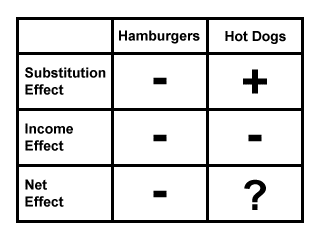When changes in price affect buyers' purchasing decisions, this effect is called the income effect. Increases in price, while they don't affect the amount of your paycheck, mean that your pay doesn’t go as far. Your purchasing power has decreased. On the flip side, decreases in price enable you to buy more. Your purchasing power has increased.
What if we're looking at two goods at once? Now things get more complicated. If the price of hamburgers goes up, while the price of hot dogs stays the same, you might be inclined to buy fewer burgers and more hot dogs. This tendency to change your purchases based on changes in relative pricing is called the substitution effect. When the price of hamburgers goes up, hot dogs look like a better deal than they used to (compared to burgers, that is), which influences you to buy fewer hamburgers and more hot dogs than you usually would. Likewise, a decrease in hamburger price would cause you to eat more hamburgers and fewer hot dogs, according to the substitution effect.
However, we also have to consider the income effect. If you don’t change your burger-buying habits, a rise in the price of hamburgers will leave you with less money to spend on hot dogs. In other words, an increase in the price of one good affects your overall purchasing power. To be sure, you will probably buy fewer hamburgers, but based on the income effect you might buy fewer hot dogs, too.
The results of combining the income effect and the substitution effect are a little unclear. By to the income effect, an increase in the price of hamburgers decreases consumption of both hamburgers and hot dogs. By to the substitution effect, however, hamburger consumption drops, but hot dog consumption rises. Thus, while it is clear what happens to hamburger consumption, since both effects tend to cause a decrease, we cannot be sure what happens to hot dog consumption, since there is both an increase (substitution effect) and a decrease (income effect).

While we cannot be absolutely certain about the net result, in general, the substitution effect is stronger than the income effect. That is, when the price of hamburgers goes up, you will most likely eat fewer hamburgers and more hot dogs, since the change in relative prices (substitution effect) affects you more than the perceived change in your income (income effect). The exception cases are those where the goods are very expensive, so that even a small change in price (in percentage terms) has a sizeable impact on purchasing power.













